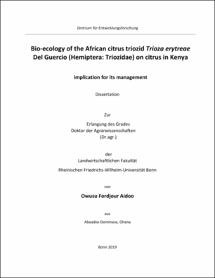Aidoo, Owusu Fordjour: Bio-ecology of the African citrus triozid Trioza erytreae Del Guercio (Hemiptera: Triozidae) on citrus in Kenya : implication for its management. - Bonn, 2019. - Dissertation, Rheinische Friedrich-Wilhelms-Universität Bonn.
Online-Ausgabe in bonndoc: https://nbn-resolving.org/urn:nbn:de:hbz:5n-53854
Online-Ausgabe in bonndoc: https://nbn-resolving.org/urn:nbn:de:hbz:5n-53854
@phdthesis{handle:20.500.11811/7986,
urn: https://nbn-resolving.org/urn:nbn:de:hbz:5n-53854,
author = {{Owusu Fordjour Aidoo}},
title = {Bio-ecology of the African citrus triozid Trioza erytreae Del Guercio (Hemiptera: Triozidae) on citrus in Kenya : implication for its management},
school = {Rheinische Friedrich-Wilhelms-Universität Bonn},
year = 2019,
month = mar,
note = {Citrus production is a major industry in Kenya. Apart from providing income and jobs, it contributes to food and nutritional security. For the last decade, citrus production has experienced a continuous decline, particularly in the Kenyan highlands. Consequently, production is unable to meet local demands, which has led to increased imports of citrus. Low production has been attributed to pest and diseases, of which the African citrus triozid (ACT) Trioza erytreae Del Guercio (Hem.: Triozidae) is the economically most important pest species due to its ability to vector “Candidatus Liberibacter africanus” (CLaf), the causal agent of the African citrus greening disease. Currently, the disease has no cure, hence the need to manage the pest in order to prevent the further spread of it. Through field surveys and laboratory studies, this thesis sought to determine the bio-ecology of ACT on citrus in Kenya and implications for its management. The results showed that ACT was widely distributed, causing more damage in shaded than unshaded citrus trees, particularly in the southeastern canopy quadrants. A newly developed predictive model revealed hotspots out of the distributional range under current and future climate scenarios. Trioza erytreae reproduction was confined to plants belonging to the family Rutaceae. Adult T. erytreae survived and reproduced on Zanthoxylum usamberensis (Engl.), Murraya koenigii (L.), Calodendrum capense(L.f.) Thunb., Teclea nobilis (Del.), Clausena anisata (Willd.) Hook. f. ex Benth. and Vepris bilocularis (Wright & Arn.) Engl. Also, plants which appeared to have superior host plant quality, as reflected by several of ACTs’ tested biological parameters, also produced adults with larger wing size and greater shape. Two host plants, i.e. V. bilocularis and T. nobilis, were reported here for the first time as alternative host plants for ACT. A spatial survey was conducted to assess seasonal variations of ACT occurrence across different altitudinal gradients with ACT populations significantly varying across different altitudinal gradients, resulting in higher pest densities in mid elevations (1,500-2,000 meters above sea level [m.a.s.l.]). The closely related Asian citrus psyllid Diaphorina citri Kuwayama (Hem.: Liviidae) was found and sampled in elevations up to 1,409 m.a.s.l. Yellow sticky card traps proved to be most efficient in trapping adult ACT. The result of a study to compare the effects of host plant quality on wing shape and size of ACT clearly showed that both geometric and traditional morphometry were useful in separation different populations of T. erytreae. The findings of this thesis thus provide relevant information to improve monitoring of ACT and to design ecologically sound integrated pest management strategies for control of this pest.},
url = {https://hdl.handle.net/20.500.11811/7986}
}
urn: https://nbn-resolving.org/urn:nbn:de:hbz:5n-53854,
author = {{Owusu Fordjour Aidoo}},
title = {Bio-ecology of the African citrus triozid Trioza erytreae Del Guercio (Hemiptera: Triozidae) on citrus in Kenya : implication for its management},
school = {Rheinische Friedrich-Wilhelms-Universität Bonn},
year = 2019,
month = mar,
note = {Citrus production is a major industry in Kenya. Apart from providing income and jobs, it contributes to food and nutritional security. For the last decade, citrus production has experienced a continuous decline, particularly in the Kenyan highlands. Consequently, production is unable to meet local demands, which has led to increased imports of citrus. Low production has been attributed to pest and diseases, of which the African citrus triozid (ACT) Trioza erytreae Del Guercio (Hem.: Triozidae) is the economically most important pest species due to its ability to vector “Candidatus Liberibacter africanus” (CLaf), the causal agent of the African citrus greening disease. Currently, the disease has no cure, hence the need to manage the pest in order to prevent the further spread of it. Through field surveys and laboratory studies, this thesis sought to determine the bio-ecology of ACT on citrus in Kenya and implications for its management. The results showed that ACT was widely distributed, causing more damage in shaded than unshaded citrus trees, particularly in the southeastern canopy quadrants. A newly developed predictive model revealed hotspots out of the distributional range under current and future climate scenarios. Trioza erytreae reproduction was confined to plants belonging to the family Rutaceae. Adult T. erytreae survived and reproduced on Zanthoxylum usamberensis (Engl.), Murraya koenigii (L.), Calodendrum capense(L.f.) Thunb., Teclea nobilis (Del.), Clausena anisata (Willd.) Hook. f. ex Benth. and Vepris bilocularis (Wright & Arn.) Engl. Also, plants which appeared to have superior host plant quality, as reflected by several of ACTs’ tested biological parameters, also produced adults with larger wing size and greater shape. Two host plants, i.e. V. bilocularis and T. nobilis, were reported here for the first time as alternative host plants for ACT. A spatial survey was conducted to assess seasonal variations of ACT occurrence across different altitudinal gradients with ACT populations significantly varying across different altitudinal gradients, resulting in higher pest densities in mid elevations (1,500-2,000 meters above sea level [m.a.s.l.]). The closely related Asian citrus psyllid Diaphorina citri Kuwayama (Hem.: Liviidae) was found and sampled in elevations up to 1,409 m.a.s.l. Yellow sticky card traps proved to be most efficient in trapping adult ACT. The result of a study to compare the effects of host plant quality on wing shape and size of ACT clearly showed that both geometric and traditional morphometry were useful in separation different populations of T. erytreae. The findings of this thesis thus provide relevant information to improve monitoring of ACT and to design ecologically sound integrated pest management strategies for control of this pest.},
url = {https://hdl.handle.net/20.500.11811/7986}
}






